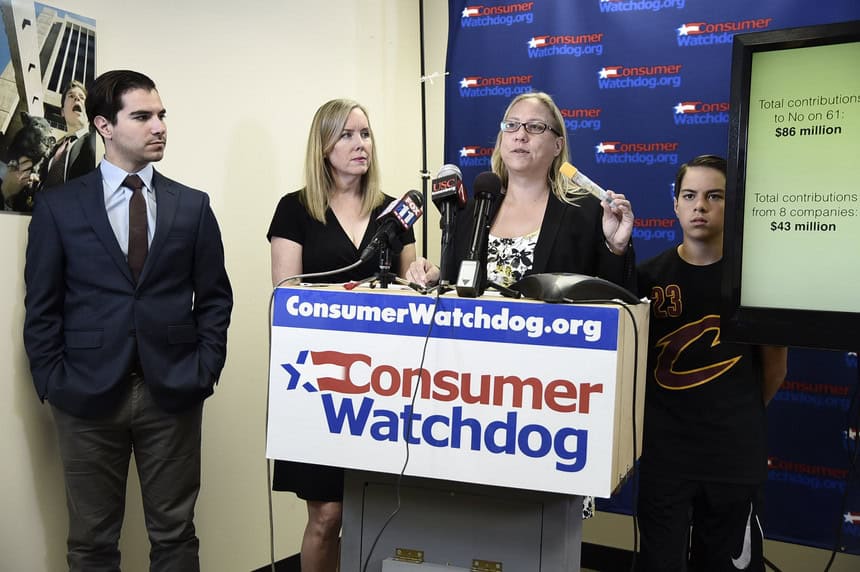Read the article below on the recent reforms to the Department of Insurance and the perspective from the Affordable Housing industry as shared by our Policy Manager, Paul Shafer. CCAH is proudly in support of the changes proposed by the Insurance Commissioner to the intervener process in filing for rate changes by insurance companies. While this is not the golden ticket to solving the insurance crisis in the state, it is a step in the right direction.
California housing groups join effort to weaken consumer advocates
They are supporting the state insurance commissioner’s effort to make it harder for advocates to try to block insurance rate hikes.
By Saqib Rahim | 10/01/2025 01:03 PM EDT

Carmen Balber of Consumer Watchdog in California speaks at an event in 2016. State housing groups are supporting an effort that would weaken Consumer Watchdog’s influence over property insurance rates. | Dan Steinberg/AP Images for AIDS Healthcare Foundation
California’s property-insurance crisis is often framed as a tug-of-war between consumer groups that want to keep premiums low and insurance companies that want hikes to reflect the state’s rising risk to climate change.
But a third group recently entered the battle: California’s powerful housing lobby.
Last week, trade associations representing home builders and property owners came out in support of recent action by Insurance Commissioner Ricardo Lara to reduce the influence of consumer-advocacy groups they blame for disrupting insurance markets.
California allows consumer advocates to object when property and casualty insurance companies ask to raise rates — and pays them for their participation. Lara proposed regulations that would give him more discretion over when advocates are paid. The move is widely seen as targeting the nonprofit Consumer Watchdog, which Lara blames for prolonging decisions on proposed rate hikes.
Insurers say the inability to get timely rate increases deters them from operating in California, resulting in less competition and higher premiums.
Housing developers and advocates say the scarcity of insurance prevents them from building.
“These projects take a couple years,” said Paul Shafer, public policy manager at the California Council for Affordable Housing, which represents builders of multifamily affordable-housing developments and supports Lara’s new regulations. “Two years into the process, you get slapped with an insurance hike five times your original [premium]. And that renders your project infeasible.”
“There’s no other business in America that takes two years to get a price change,” said Dan Dunmoyer, president and CEO of the California Building Industry Association, which says its members build nine out of every 10 new housing units in the state.
The scarcity of affordable insurance means “we can’t sell homes, or if we do, we sell them at a much higher price point,” Dunmoyer said.
Consumer Watchdog says its interventions have saved policyholders $6 billion in insurance bills, mostly in property and auto insurance, from 2002 through 2024. The group says it’s been awarded $14 million for its participation, mostly to pay experts it hired to evaluate the insurance filings.
“It’s an unbelievable deal for the public,” said Jamie Court, the group’s president. “It’s very difficult to get paid. [Lara’s] just making it more difficult.”
Lara’s action highlights how the state’s need to tackle the spiraling cost of living is increasingly colliding with its long traditions of environmental and consumer protection.
The nonprofit California Housing Partnership says the state lacks about 1.3 million units just for low-income renters. About 44 percent of California residents are renters.
Insurance hikes increase housing costs
Since November’s election, when Democrats lost seats in part due to voter outrage about living costs, California Gov. Gavin Newsom (D) has pushed to expand the state’s housing stock. In June he signed bills that speed up construction permitting and roll back environmental reviews for many types of housing.
Another thing driving up the cost of living: property insurance rates.
Recent inflation and natural disasters have increased the cost of claims, prompting insurers to nonrenew many policyholders and hike rates for others.
Insurance companies say one reason they’re pulling back from California is a regulatory system that prevents them from hiking prices to account for increased disaster risk and cost inflation.
One culprit, they say, is California’s unique intervenor process. Under Proposition 103, passed by state voters in 1988, consumer advocates can object to efforts by insurance companies to raise prices.
If the insurance commissioner deems these objections substantial, advocates can ask to recover the costs and expenses for reviewing these highly technical rate filings. Insurance companies pay the award and can pass the costs to customers.
Lara agrees with insurers that say Consumer Watchdog has abused the system and is a major factor in prolonging decisions on new rates.
Filings that don’t have intervenors average 256 days, whereas filings that do average 529 days, Insurance Department spokesperson Michael Soller said in an email.
Lara’s proposed regulation would give the commissioner added power to decide what counts as a substantial contribution, saying it must make “a significant, distinct contribution to the Commissioner’s adoption of a decision, order, or regulation.”
It would also make it harder for an intervenor to get compensation if its arguments resemble the judgments of the department or seem to be delaying the process for its own sake, rather than contributing constructively.
Doug Heller, director of insurance at Consumer Federation of America, which has intervened in California property-insurance proceedings, said the regulations will strengthen insurance companies’ position at consumers’ expense.
“I have been involved in proceedings for over 20 years, and I have never seen any consumer representative try to drag out a proceeding,” he said by email. “Insurers complain about this process not because it doesn’t work but because it does.”
The proposal will now go to a November public hearing overseen by department legal staff. Court, of Consumer Watchdog, said he considers this a “rubber stamp” procedure but will argue against it nevertheless.
The housing trade associations said they hope Lara’s proposals will speed up insurance approvals, encourage insurers to expand in California and boost construction.
Dunmoyer of the building association said that as insurance companies have pulled back in California, they’ve retrenched sharply on a type of property insurance written for condominium owners.
Prices for condo insurance rose so sharply that builders paused new condominium construction for a year and a half, he said.
